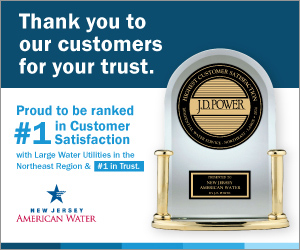Clean Water Action: People Stand United Against Fracking and the Proposed PennEast Pipeline
People Stand United Against Fracking and the Proposed PennEast Pipeline
Delaware River Basin Commission Public Meeting June 13
West Trenton, NJ – The Delaware River Basin Commission (DRBC) conducted their June 13 business meeting with a public comment session at the West Trenton Fire House where people spoke in a united stand against fracking in the Watershed and the PennEast pipeline, both activities under current review by the DRBC.
While DRBC is not expected to vote on these immediately, people came from throughout the region to take the last opportunity to speak to the Commissioners before the fall and make their demands clear. Representatives from organizations and communities expressed that they want a COMPLETE fracking ban throughout the Delaware River Watershed – no fracking, no frack wastewater discharges and no export of Delaware River Basin water for fracking and they want the DRBC to exercise their full authority over the proposed PennEast pipeline with a comprehensive review under strict watershed regulations.
“It has become abundantly clear that the DRBC, through their proposed fracking regulations in the Delaware River Basin, is ignoring clear science,” said Alyssa Bradley, Energy Organizer, Clean Water Action. “The USEPA, bravely contradicting the Trump administration and Scott Pruit, stated in their most recent report that the lack of scientific review on fracking wastewater and its specific components is an insurmountable data gap. The notion that the DRBC would ignore that report is unconscionable. We need the DRBC and Governor Murphy to ban all fracking and fracking related activity in the basin! This is not one of Trump’s failed casinos. They cannot gamble with the drinking water of 15 million people and the life of the wild and scenic Delaware River.”
“There is a clear need for a total ban on fracking and its impacts in the Delaware River watershed, including fracking, fracking wastewater and transfer of water for fracking. EPA documents that fracking wastewater pollutes waterways and the DRBC has not shown that fracking wastewater won’t degrade the Delaware River watershed,” said Doug O’Malley, director of Environment New Jersey. “This is part of a larger movement to ensure that fracking infrastructure – from the PennEast pipeline to fracking wastewater – doesn’t destroy the Delaware River watershed and that DRBC asserts its authority to stand up for the watershed.”
“The DRBC Commissioners need to take a strong and clear stand with regards to the PennEast Pipeline. For well over a year we have been asking the DRBC to commit to requiring a DRBC docket for the entire length of the pipeline, not just pieces and pockets. And yet, the public has yet to hear a response. We have been urging the DRBC to be clear with PennEast and the public that it will prohibit any tree felling in the absence of all needed permits including a DRBC docket. Our inquiries have been met with silence. We have been documenting for the DRBC the wealth of false, misleading and missing information they have been provided by PennEast and FERC to support DRBCs review. DRBC responded by telling us there is no official comment period ongoing. DRBC is working closely with PennEast, from the many emails and communications we see in the files this is clear. But the public is being shut out and met with silence. We are at the June 13 meeting to demand the DRBC consider our concerns and answer our questions,” said Maya van Rossum, the Delaware Riverkeeper and leader of the Delaware Riverkeeper Network.
“Even the EPA under Scott Pruitt has said that fracking waste is a serious environmental problem. It’s difficult to test for, contains too many chemicals, and is even more difficult to treat, putting our waters at serious risk. This is why the DRBC should do their job and ban fracking waste treatment and discharge in the Delaware Basin. We’re glad they want to ban fracking, but we’ll still get the effects of it if we allow waste to be brought into the Basin. There’s companies such as Elcon and DuPont who could end up dumping on the Delaware without this ban,” said Jeff Tittel, Director of the New Jersey Sierra Club. “We need to follow sound science, not political science, to protect the drinking water for 17 million people!”
“We want to help the DRBC Commissioners decide what to do about fracking, its activities and infrastructure so we came today to articulate that we want a COMPLETE fracking ban with no frack wastewater dumping and no water exports for fracking. The recently released frack wastewater report by the U.S. Environmental Protection Agency makes it clear that the pollution risks of this toxic effluent are simply too great to be allowed with dire consequences where surface water discharges are occurring, such as Pennsylvania and West Virginia. DRBC must completely ban fracking to protect our water and communities and they must exercise their full authority over the PennEast pipeline,” said Tracy Carluccio, Deputy Director, Delaware Riverkeeper Network.
“Water is life. Fracking in Pennsylvania generates 264 million gallons of wastewater annually, and treating that wastewater is a multi-billion dollar industry. This dirty business has no place in the Delaware River watershed. By opening up the watershed to frack wastewater treatment, we are incentivizing the poisoning of a source of drinking water for millions. Greedy corporations are seeking to make a profit at the expense of our health and safety. Governor Murphy must be a leader in protecting our drinking water and call for a complete ban on fracking in the Delaware River Basin,” said Lena Smith, Senior New Jersey Organizer with Food & Water Watch.
“The Delaware River Basin can still be contaminated if waste import is allowed. True we absolutely need to step away from fossil fuel use, gas and oil, but does contaminating the Delaware River Basin make sense before we get there? Our efforts have to go toward vastly reducing usage without further damage to the environment or health,” said Barbara Arrindell, Director, Damascus Citizens for Sustainability.
“The drinking water for millions of people across the four Basin states would remain at risk from toxic fracking waste should these draft regulations move forward,” said Rob Friedman, Policy Advocate, Natural Resources Defense Council. “A real ban would not only keep drilling out of the Delaware River Basin, but toxic wastewater too—and it would not allow companies to take freshwater from the basin for fracking elsewhere. We urge the commission to protect communities and residents’ health by keeping all of these threats out of the region.”
Background:
Since 2010 the DRBC has prohibited natural gas extraction projects in the Delaware River Basin while they study its potential impacts on water resources, a de-facto moratorium that does not allow permits to be issued until natural gas regulations are adopted.
A mounting call by the public for transforming the current moratorium on natural gas drilling, fracking and related activities in the Delaware River Watershed into a permanent ban has resulted in the proposed fracking ban but the DRBC also included the allowance of frack wastewater discharges and the withdrawal of fresh water for fracking, as instructed by a resolution passed by the DRBC Commissioners at their September 13 public business meeting. The draft regulations were required to be issued by Nov. 30.
Since 2010, scientific analyses, public health statistics, peer-reviewed studies, and government records show that the impacts of gas and oil development significantly harm the environment including our water, air, habitats and communities’ health, despite regulatory controls. The experience of communities where fracking is occurring are the proliferation of adverse health impacts due to gas drilling and fracking operations and its inherent air and water pollution. The overwhelming weight of the evidence shows that shale gas cannot be extracted or developed safely, making this the right time to enact a Watershed ban on all gas development.
The five voting members – the Commissioners – of the DRBC are the Governors of the four states whose tributaries flow to the Delaware – Pennsylvania, New York, New Jersey and Delaware – and the Army Corps of Engineers, representing the federal government. As an autonomous agency formed under federal law to manage the shared waters of the Basin, the Commission members are responsible for protecting the drinking water supplies of 15 to 17 million people, including New York City and Philadelphia, and the federally designated Wild and Scenic Delaware River.
###
Clean Water Action, founded in 1972, is a one million-member nationwide organization with more than 100,000 New Jersey members. We work to win strong health and environmental protections by bringing issue expertise, solution-oriented thinking and people power to the table. We fight for clean water; environmental justice, and environmentally safe jobs and businesses despite the hostile anti-environment climate in our nation’s capital. www.cleanwateraction.org/nj









